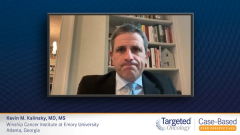
Unmet Needs and Future Directions in HR+/HER2-low Metastatic Breast Cancer
Closing out his review of HR+/HER2-low metastatic breast cancer management, Kevin Kalinsky, MD, considers unmet needs and ongoing investigation into novel treatment strategies.
Episodes in this series

Transcript:
Kevin Kalinsky, MD: I think there are a number of unmet needs for patients with hormone receptor-positive, HER2-negative or HER2-low disease. This is an area that I still feel is underinvestigated. And what we see is that for patients who have endocrine-sensitive disease, there are a number of agents that are being evaluated: SERDs [selective estrogen receptor degraders] and SERMs [selective estrogen receptor modulators] and SERCA [inhibitors], and all of these potential endocrine therapies that are often being evaluated with other target therapies that we’ve talked about, like mTOR inhibitors, or PI3K inhibitors, or CDK4/6 inhibitors, etc. But for these patients who have endocrine-resistant disease, oftentimes we’re in the boat where we’re giving chemotherapy, or antibody-drug conjugates [ADCs]. I do want to say that for patients who have hormone receptor-positive, HER2-low disease, there’s this overall survival advantage based upon the DESTINY-Breast04 trial of giving trastuzumab deruxtecan versus physician choice chemotherapy. The majority of patients in that study had hormone receptor-positive disease.
We also have data from the TROPiCS-02study, which is a more heavily pretreated population, comparing sacituzumab govitecan versus physician choice chemotherapy, and there was an overall survival advantage in that study as well. So commonly we’re sequencing ADCs, but we really don’t have any clinical data demonstrating the efficacy of ADC after ADC. I think other future questions include, what about the role of potential other antibody-drug conjugates? What about other TROP-2 antibody-drug conjugates like dato-DXd [datopotamab deruxtecan]? We’re waiting the results of the randomized TROPION study, which is evaluating in this particular patient population, dato-DXd versus physician choice chemotherapy. What about HER3 antibody-drug conjugates, is there a role for those agents as well?
I think that there are a number of agents of particular interest. But I still think there could be more, and also [we need to] to better understand the best and optimal sequencing of the various agents, both in endocrine-sensitive disease as well as endocrine-resistant disease.
Transcript edited for clarity.










































